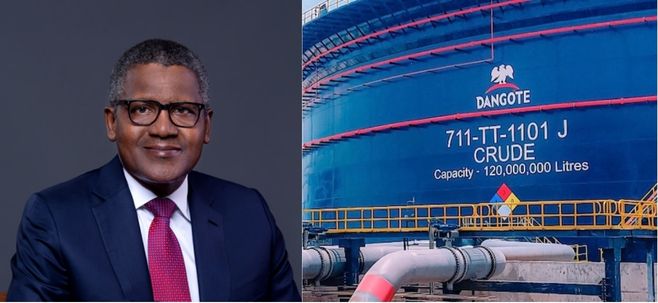Aliko Dangote, the chairman of Dangote Group, has announced that the Dangote Refinery, with a capacity of 650,000 barrels per day, is set to satisfy the petrol demands in Nigeria and across the entire sub-Saharan region.
This statement was made during a press briefing on Tuesday as reported by Prime Business Africa, marking the inspection of the state-of-the-art refinery.
Join our WhatsApp ChannelSpeaking to reporters, Dangote emphasised the significance of the refinery’s capacity. “Today is a very special day,” he said.
“Nigeria has not produced petrol, which is gasoline, for many years. But I stand with you today, to salute the people of Nigeria and the government of President Bola Tinubu, for creating the environment for us to thrive and achieve this monumental task of providing energy for growth, development, and prosperity.”
Naira for Crude Initiative Commended
Dangote praised President Tinubu’s “Naira for Crude” initiative, which aims to stabilise the Nigerian currency by reducing the demand for dollars in the market. “This initiative will create stability for the Naira, as it will address 40 percent of the demand for dollars,” he explained.
The initiative ensures that naira will also be used for petroleum products, further supporting the local economy.
According to Dangote, the refinery’s products will be available in the Nigerian market once final arrangements are made with the Nigerian National Petroleum Company Limited (NNPC).
He highlighted the refinery’s ability to eliminate the need for fuel imports and reduce the country’s reliance on foreign exchange.
Tracking True Consumption
Dangote also addressed issues related to fuel distribution, particularly the problem of round-tripping, where fuel meant for Nigeria is diverted elsewhere.
READ ALSO: Dangote Refinery Rolls Out First PMS Products
“As we have this refinery working, it will show the true consumption of Nigeria. We can track every single loaded truck, and we will try as much as possible to track the loaded ships. This transparency will ensure that the fuel actually reaches its intended destination,” he said.
Impact Beyond Nigeria
The chairman expressed confidence that the refinery’s operations would have a transformative impact not only in Nigeria but across sub-Saharan Africa.
“The capacity that we have will not only meet Nigeria’s demand but also the demand of the entire sub-Saharan Africa,” Dangote stated. This ambitious vision is expected to reshape the energy landscape of the region.
High-Quality Fuel for Nigeria and Beyond
Dangote assured that the petrol produced at the refinery would be of the highest quality, matching global standards.
“You are now going to have good petrol where the engines of your vehicles will last longer. The quality here will match that of anywhere in the world, including the U.S.,” he said.
This commitment to quality aims to protect consumers and ensure that their vehicles run smoothly without issues.
Economic Benefits: Import Substitution and Foreign Exchange Earnings
The refinery’s operations are also expected to yield significant economic benefits for Nigeria. Dangote highlighted the importance of import substitution, stating, “We will begin real import substitution, which will save our nation’s foreign exchange and also earn foreign exchange, stabilise the naira, and help bring down inflation and the cost of living.”
Furthermore, Dangote mentioned the refinery’s role in addressing the country’s demand for polypropylene, a key raw material used in various industries. From October, the refinery is set to fully meet Nigeria’s polypropylene needs, eliminating the need for imports.
“Nigerians will no longer have to import polypropylene into the country, as the refinery will satisfy the polypropylene market 100 percent,” he added.
Looking Forward
As the Dangote Refinery prepares to commence full operations, it stands as a symbol of Nigeria’s industrial capability and potential to drive economic growth in the region.
With its promise to meet local and regional demand, stabilise the currency, and improve the quality of fuel, the refinery is poised to play a crucial role in shaping the future of energy in sub-Saharan Africa.
Emmanuel Ochayi is a journalist. He is a graduate of the University of Lagos, School of first choice and the nations pride. Emmanuel is keen on exploring writing angles in different areas, including Business, climate change, politics, Education, and others.
- Emmanuel Ochayihttps://www.primebusiness.africa/author/ochayi/
- Emmanuel Ochayihttps://www.primebusiness.africa/author/ochayi/
- Emmanuel Ochayihttps://www.primebusiness.africa/author/ochayi/
- Emmanuel Ochayihttps://www.primebusiness.africa/author/ochayi/



















Follow Us